FROM CORSICA VILLAGE TO THE KINGDOM OF FRANCE: NAPOLEON BONAPARTE
Napoleon Bonaparte (1769-1821) was a Corsican-born French General and politician who reigned as Emperor of the French from 1804 to 1814 and again as Napoleon I in 1815. He established the largest empire on the European continent since the reign of Charlemagne. Although the Napoleonic Wars (1803-1815) had destructive aspects, they brought liberal reforms to the lands they conquered.
Napoleon, who was born as the child of a Corsican noble family, rose to prominence in the French army during the French Revolutionary Wars (1792-1802), rose in the career ladder, and became the French army commander in the Italian and Egyptian campaigns. He took control of the French Republic with the 18 Brumaire Coup in 1799 and declared himself Emperor of France in 1804. With Emperor Napoleon and the famous Grand Army (Grande Armée) under his command, European countries fought against various coalition forces, and when the Treaties of Tilsit were signed in July 1807, his reign covered most of the lands of Western and Central Europe.
After Emperor Napoleon's invasion of Russia in 1812 failed, most European countries opposed him. He was defeated around this time and was exiled to Elba Island, an island in the Mediterranean, in 1814. However, the next year, he returned to France in a triumphant manner and started the Second Reign, known as the Hundred Days. Shortly after, he was defeated once again in the Battle of Watertloo (June 18, 1815) and was then exiled for the second time to Saint Helena Island in the South Atlantic Ocean, where he died after a while.
Napoleon Bonaparte is best remembered for his military career; During his career, he participated in 60 battles and lost only seven. The military innovations he made in the French Army led to changes in the European method of war, introduced compulsory military service, popularized the corps as the largest unit in the army, and pioneered the new military tactics he worked on. Napoleon is often cited as one of history's most brilliant generals, along with Alexander the Great and Julius Caesar. He also introduced a series of civil codes known as the Napoleonic Code, which became accepted throughout much of continental Europe and influenced the judicial systems of many modern nations. Alternately seen as a reformer, an autocrat, a warrior, and a defender of freedom, Napoleon also has a controversial reputation and remains one of the most well-known figures in Western History.
His Youth
Napoleon, who would become the future French Emperor, was born on August 15, 1769, in the city of Ajaccio on the Corsica Island, under the identity of Napoleone Di Buonaparte. The Buonaparte family is of Italian origin and migrated to the French island of Corsica in 1529 and settled among the small noble families on the island. Napoleon's father, Carlo Buonaparte, was a lawyer and wealthy enough to own the three-story Casa Buoanaprte estate in the city of Ajaccio, as well as a country house, a vineyard, and a flock of sheep. Napoleon is the second surviving child of Carlo and Maria-Letizia Buonaparte; He had an older brother named Joseph and younger siblings named Lucien, Elisa, Louis, Pauline, Caroline and Jerome.
The island of Corsica was under Genoese/Republic of Genoa control for centuries, but was allowed to effectively carry out its own administrative activities. In 1768, the Genoese Republic sold Corsica to the Kingdom of France, which was interested in a more direct form of government. This situation was met with the objection of the people of the Island, and the French expedition to the Island failed due to the resistance of a group of Corsican Freedom Fighters led by the charismatic Pasqual Paoli. The French were defeated by the Corsican force led by Pasqual Paoli in the fateful Battle of Ponte Novu in May 1769. Napoleon's father, Carlo Buonaparte, initially supported the independence of the Island of Corsica, but later, after the defeat of the Corsicans, he swore allegiance to his French overlords. In response, the new French administration gave new titles and awards to the Buonaparte family.
In April 1779, father Carlo sent his two eldest sons to school in France, thanks to his connections with the new French administration. Napoleon, who was only nine years old, was enrolled at the Royal Military School at Brienne-le-Chateau near Troyes to begin his military career training. Napoleon spent the next five years in this boarding school; His harsh Corsican accent, his strange-sounding name to the French, and his strong sense of Corsican patriotism were what distinguished Napoleon from other students. Napoleon, who did not have many friends at school, turned to books. He once considered starting a writing career and wrote at least 60 articles, short novels and booklets, including History of Corsica. Napoleon was an intellectually gifted student in the classroom, especially in mathematics. Although he received education from priests, he had doubts about the divine personality of Jesus Christ; This skepticism led Napoleon to see religion as a political tool, which he would use effectively throughout his career.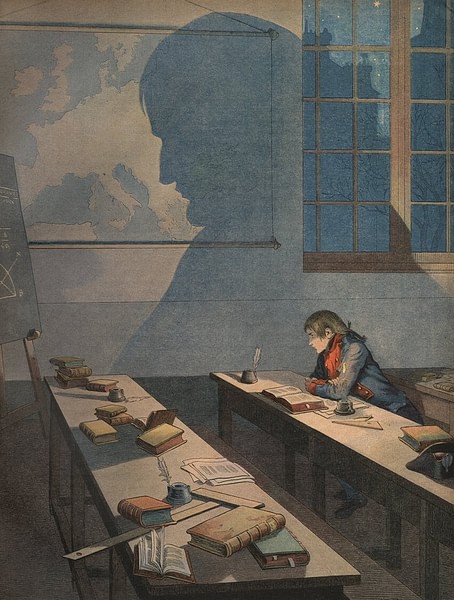
Father Carlo Buonaparte died in February 1784. Two years later, Napoleon graduated from the prestigious Ecole Militaire (military) school as an artillery lieutenant, and spent most of the months after graduation on leave on the island of Corsica. Napoleon and his brothers enthusiastically supported the spirit of the French Revolution, which started in 1789. Napoleon received the rank of lieutenant colonel in the Revolutionary National Guard in April 1792. The support of the Buonaparte brothers to the French government caused them to come into conflict with the Pasqual Paoli movement, which advocated the independence of the island of Corsica. The increasing tension between the Buonaparte brothers and Paoli supporters lasts only a short time. Exiled from his homeland, Napoleon is no longer a Corsican nationalist, but a revolutionary devoted to the cause of France.
Revolution
Revolutionary France went to war with Austria and Prussia in the spring of 1792, starting the Revolutionary Wars. After France's victory in the Battle of Valmy (September 20, 1792), the First French Republic was declared and King Louis XVI was executed by guillotine on January 21, 1793. As the French Republic became more radical and aggressive, governments of other countries followed France's lead. European countries, including Great Britain, Spain, and the Dutch Republic, declared war against France. A fleet of British and Spanish ships occupied the Port of Toulon on August 28, 1793. The Port of Toulon was of vital importance to the French Republic as it was capable of accommodating the entire French Mediterranean Fleet.
Napoleon, meanwhile, published a pro-Jacobin pamphlet entitled Le Souper de Beaucaire, in which he defended the necessity of the policy of extreme measures pursued by the revolutionary French government. This pamphlet influenced many powerful leaders, and this process led to Napoleon's appointment as commander of the French artillery at the Siege of Toulon. Commander Napoleon had demonstrated his leadership ability during the siege; The cannons he used were very important for the French victory on December 19, 1793. Although Napoleon was wounded during his last attack, he received the rank of brigadier general after the war, when he was only 24 years old.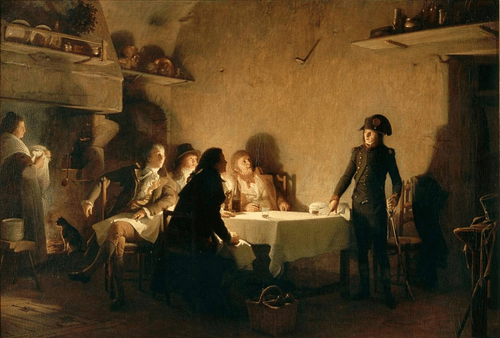
The Period of Terror in France ended in July 1794 and the Jacobins fell from power; Napoleon was also briefly arrested but later released. With the fall of his benefactors, it became clear that Napoleon's short-lived career might already be over. For Napoleon, this situation began to change in the course of social life when the Republican Government was trying to defend against the Royalist uprising approaching the capital Paris on October 4, 1795. Since Napoleon was one of the few qualified officers in the capital Paris, he was given the responsibility of defending the country and fulfilled this task with ruthless efficiency. The troops under the command of Napoleon seized some cannons and opened fire on the crowd.
By suppressing the 13 Vendémiaire Rebellion, Commander Napoleon attracted the attention of Paul Barras, one of the leaders of the new Government Body called the French Directiore Français. In 1795, Paul Barras introduced the young General Napoleon to the 32-year-old widow Josephine de Beauhurnais, with whom he immediately fell in love, and also ensured that Napoleon was appointed commander of France's Army of Italy. Napoleon married Josephine in an official ceremony on March 9, 1796, before leaving for his Italian campaign two days later. From this point on, his Frenchized name began to be recorded as "Napoléon Bonaparte".
Italy, Egypt and Brumaire
When Napoleon first came to Italy as a young Army Commander, his officers did not take Napoleon seriously at first. Small in stature, with a weak physical build, he was only 26 years old and had no experience commanding the army. However, these views of the officers began to change rapidly in a short time. Commander Napoleon brought the undisciplined Italian Army into order and, after procuring the most needed supplies in a short time, launched a lightning operation against the Kingdom of Piedmont-Sardinia and ended the war within a month. Later, he organized a campaign against Austria, captured Milan and founded several pro-French city-states in Northern Italy. The Austrian fortress continued to besiege the city of Mantua/Montova, defeating the Austrian armies in the Battle of Castiglione (05 August 1797), the Battle of Arcole (15-17 November 1797) and the Battle of Rivoli (14-15 January 1797). After the city of Montova finally fell in February 1797, Napoleon's army began to make preparations to threaten Vienna. Austria requested a ceasefire, and when the Treaty of Campa Formio was signed in October, the First Coalition War ended.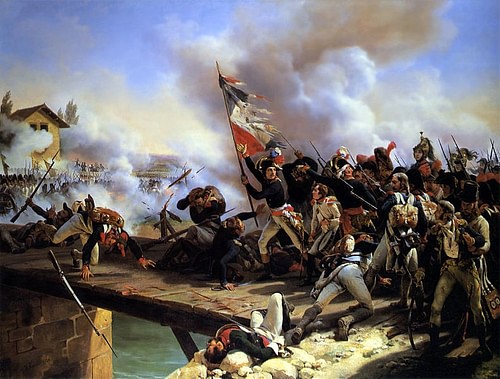
Napoleon's brilliant victory in the Italian Campaign earned him the love of the French troops, who affectionately called him "Little Corporal", and also brought him to the level of political superstardom in France. It became well known with narratives such as the heroic attack on the Arcole Bridge and formed the basis of the Napoleonic legend. In 1798, Napoleon also received permission to send an army to Egypt to threaten British domination in the region. After defeating the Mamluk forces in the Battle of the Pyramids (21 July), he advanced towards Syria, but was stopped by British-Ottoman forces during the Siege of Acre (20 March - 21 May). He was forced to retreat to Alexandria in August 1799 and escaped from Egypt. Although Napoleon's Egyptian and Syrian Expeditions ended in military failure, the discovery of the Rosetta Stone led to significant developments in the field of Egyptology.
Napoleon landed on the island of Elba in October 1799 to return to France, and some French political officials who were dissatisfied with the current administration, such as Emmanuel-Joseph Sieyes, who wanted to use him as a coup "sword", approached Napoleon. Napoleon accepted the proposal and overthrew the current government with the 18 Brumaire Coup, a bloodless coup on 9-10 November 1799. Later, he left Sieyes behind and became the leading person in the new government Executive Branch called French Consulate/Consulat Français. His rise to power marked the end of the French Revolutionary period and the beginning of the Napoleonic era in France.
First Consul and Emperor
Napoleon's tenure as First Consul lasted four years, during which he was able to achieve some of his most enduring political achievements. He negotiated the Concordat of 1801, which reconciled France with the Catholic Church, and enacted the Napoleonic Code, which included some of the liberal reforms of the Revolution. He sent an occupation force to Haiti to take back Haiti and re-establish the slavery system. The invasion force sent failed and Haiti gained independence in 1804. As First Consul, Napoleon began the sale of Louisiana, which doubled the size of the United States. Militarily, he crossed the Alps and defeated the Austrian forces in the Battle of Marengo (June 14, 1800), bringing an end to the Revolutionary Wars with the Treaty of Amiens two years later. Meanwhile, through a referendum, he received the title of First Consul for life.
Napoleon knew that the newly established regime would not be safe unless he could establish a hereditary empire. On May 18, 1804, he declared himself Emperor and the Empire of France. The Coronation Ceremony of Napoleon I was held on December 2 at the Notre Dame de Paris Cathedral, and during the ceremony, Napoleon himself took the Crown and placed it on his head. From this stage on, England declared war on France in May 1803, and the Napoleonic Wars had already begun. After Napoleon was crowned first as the Emperor of France and then as the King of Italy before March 1805, the British forces opened the War of the Third Coalition (1805-1806) against France; The forces of Austria, Russia and Naples also participated. Emperor Napoleon, without wasting any time, marched on Germany at the head of his Grand Army (Grande Armée), which was divided into eight semi-independent corps to gain more speed and flexibility.
The corps system proved to be highly effective and enabled Napoleon to force the Austrian army to surrender at the end of the Ulm Campaign. He captured Vienna on 13 November and, largely following the surrender of Austria, which was considered one of his greatest victories, he took several German states under his protection and reorganized them as the Confederation of the Rhine. This arrangement directly led to the dissolution of the Holy Roman Empire in July 1806. Napoleon also dethroned the Bourbon King of Naples and placed his brother Joseph on the Royal Throne. While his brother Louis Bonaparte ascended to the throne of the King of the Netherlands in 1806, his other brother Jorem became the head of the Kingdom of Westphalia in 1807. Napoleon, who attempted to establish a dynasty, was often criticized for giving too much power to his brothers who did not have the necessary talents.
In October 1806, Prussia participated in the War of the Fourth Coalition (1806-1807) together with Russia and England. French forces under the command of Napoleon defeated the Prussian army in the Battle of Jena-Auersted (October 14) and entered Berlin just a few days later. Napoleon advanced towards Prussian-occupied Poland and established the Grand Duchy of Warsaw as a new client state before fighting Russian forces in the bloody Battle of Eylau (February 7-8, 1807). On June 14, they defeated Russia in the Battle of Friedland and then met with the Russian King Alexander I (1801-1825) on a raft in the middle of the Niemen River to hold peace talks. With the subsequent Treaties of Tilsit, the French-Russian alliance was established and King Alexander I agreed to participate in Napoleon's large-scale embargo sanction against Britain, known as the Continental System. It is understood that Prussia also lost half of its territory with the agreements made. This period was when Napoleon was unquestionably at the peak of his power; Its sphere of influence has spread to the territory of Western and Central European countries.
Spain and Russia
Emperor Napoleon ordered Portugal to be punished for not complying with the Continental System, which was the blockade sanction he imposed in 1807. While the capital Lisbon was experiencing a rapid decline, Napoleon was not yet satisfied. Always looking for an opportunity, Napoleon took advantage of a dispute between the Spanish Royal family to invade Spain and place his brother Joseph on the Spanish Crown throne. The Portuguese and the Spanish quickly resisted the French occupation and started the Iberian Peninsular War (1807-1814). The Portuguese and the Spanish, with the help of British military forces, launched a resistance movement that included brutal guerrilla warfare. Before long, the advance of 200,000 French soldiers in the region was stopped, and this put a strain on French military resources.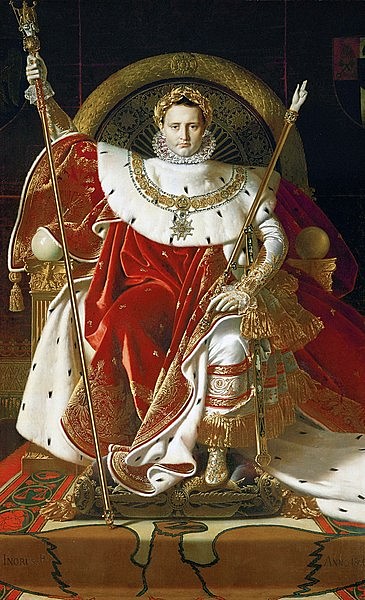
Meanwhile, the success of the Iberian rebels encouraged the Austrian Empire to launch the War of the Fifth Coalition in April 1809. Napoleon Bonaparte suffered his first defeat as Emperor at the Battle of Aspern-Essling (21-22 May) on the banks of the Danube River. Although the Austrian forces regrouped in the Battle of Wagram (05-06 July) and were defeated, the Battle of Aspern-Essling proved to European countries that Napoleon could also be defeated. Emperor Napoleon married the Austrian Archduchess Marie Louise, daughter of the Habsburg Emperor, in April 1810, after the Austrian War. He divorced his wife Josephine in January the previous year because she did not give him an heir son. Marie Louise was born on March 20, 1811, to Henry II, who was called the King of Rome. She gave birth to a son named Napoleon.
By 1811, the French and Russian empires were on a collision course. While the Russian administration saw the Warsaw Duchy under French control as a threat to itself, Emperor Napoleon thought that Tsar Alexader was betrayed because he left the Continental System. As the largest invasion force Europe has ever seen, Napoleon's forces began their invasion of Russia on June 24, 1812, when more than 615,000 French and Allied military forces crossed the Niemen River, but Russia did not enter the war. French forces retreated deep into their own territory and began to implement scorched earth tactics along the way. This application has been a method with very impressive results; because the French had lost more than 100,000 soldiers before the first major war started. On September 7, the French and Russians participated in the bloody Battle of Borodino, which opened the way to Moscow for the French armies, and a week later, Napoleon's forces entered Moscow, but found the city abandoned. The city was soon engulfed in flames and became unusable for the invading French army.
Collapse
Realizing that the Russians did not intend to make peace, Napoleon decided to withdraw in October. However, the onset of harsh winter conditions and the Russian armies following the French forces and knowing the region decimated Napoleon's Grand Army. French forces lost half a million soldiers when they crossed the Niemen River again in December 1812. The European great powers finally seized the chance to defeat Napoleon. In the subsequent War of the Sixth Coalition (1813-1814), the forces of England, Prussia, Austria and Sweden also joined Russia. After Napoleon suffered another crushing defeat at the Battle of Leipzig (16–19 October 1813), most of the German Allies had fled and the Confederation of the Rhine was dissolved. The Sixth Coalition then occupied French territory, and Napoleon had no choice but to abdicate the Imperial Throne on April 11, 1814. Napoleon was exiled to the Island of Elba in the Mediterranean, and Louis XVIII ascended the throne as King of France.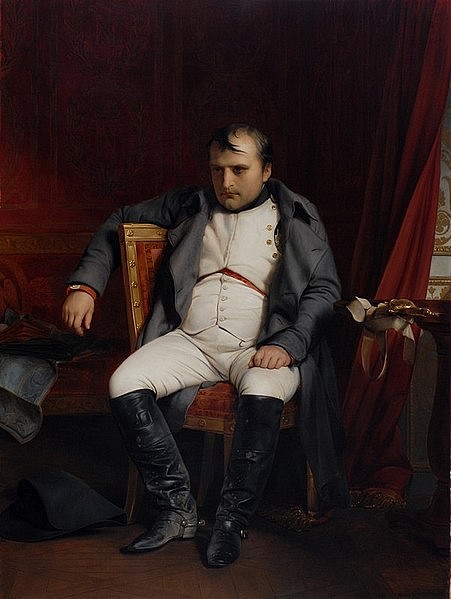
On March 1, 1815, Napoleon Bonaparte took advantage of the political unrest caused by the Restoration of the Bourbon Dynasty and landed on the coast of Southern France with a military force of 1000 people. On March 20, he entered Paris as if he had won a great victory and started the process known as the Hundred Days, the period of the Second Reign. His enemies lost no time in branding Napoleon as an outlaw and establishing a new army. In late May, the Seventh Coalition sent two armies to Belgium to threaten northeastern France. One of these two armies was the Anglo-Dutch-German army under the command of Arthur Wellesley, Duke of Wellington, and the Prussian army under the command of Gebhard Leberecht von Blücher. Napoleon marched on Belgium on 15 June 1815 to respond to this new threat, but suffered a decisive defeat in the Battle of Waterloo (18 June 1815). Four days later, he abdicated the Imperial Throne again and was exiled to the uninhabited island of Saint Helena in the South Atlantic Ocean. He was kept on the Island under the close supervision of British guards, and while his health was gradually deteriorating, he died on May 5, 1821, at the age of 51.
Napoleon Bonaparte rose to the empire very quickly from a young age and gained great fame and charisma, I think he deserves it all.
Thank you for listening to me, don't forget to comment and like, thank you.























































![[LIVE] Engage2Earn: Let's keep Sam delivering for Hawke](https://cdn.bulbapp.io/frontend/images/2c5d8b18-5618-4a2a-9051-89ceddbcdfd5/1)


